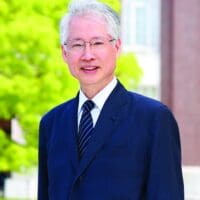This lecture explores the characteristics and significance of the philosophy of Kyoto School, which came to be known widely but is still not fully clear. Kyoto school, unlike ordinary philosophical schools, did not arise from crit- icisms of preceding schools and postulating a certain thesis. Rather, it was a group naturally formed around Kitaro Nishida and his successor, Hajime Tanabe. The possible definition of the philosophy could be: “The totality of intellectual networks mutually and intimately formed by those who were affected by Nishida and Tanabe at its center.”
Its primal characteristic is an emphasis on independent thinking. The disci- ples of Nishida and Tanabe made Selbstdenken a motto, meaning “to think subjectively on their own.” It reflects Nishida’s thought that demanded his disciples to place emphasis on classical studies and “outlive them.” For that purpose, it was important to mutually criticize and create unique thoughts.
The emphasis on the concept of “nothingness” is its philosophical charac- teristic. For example, Nishida understood “self ” not merely as the subject of the consciousness but as “place” that supports the activities of the subject. Place cannot be grasped as a certain existence such an objective thing, but only be expressed as “nothingness.” Nishida reverses the understanding of Aristotle’s “substance” (ousia) and expresses it as “the predicate that never becomes the subject.” The thought of Zen—which considers nothingness as the way of free self being freed from desire and discriminatory thinking—has also influenced the philosophy of Nishida and Kyoto School.

Masakatsu Fujita, DPhil
Kyoto University
Fujita is professor emeritus of Kyoto University and former professor at the Graduate School of Advanced Integrated Studies in Human Survivability and former chair of the Department of the History … MORE

